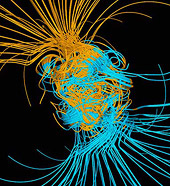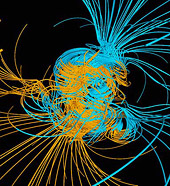

The Scientist reports that a team led by David Gubbins at the University of Leeds has done some analog datamining to find out more about the stability of the Earth’s protective magnetic field in which there has been a 10% decrease in the last 160 years. For acquiring data which is reaching farther into the past, they resorted to logs of ships from 1590 to 1840. Through the logs, rigorously kept by sailors who used the sun and stars to judge the accuracy of their compasses, the researchers could add additional data to the measurements that had been taken since 1840 when Carl Friedrich Gauß invented the magnetometer. “Whoever did a lot of trading generated a lot of data”, Gubbins says, refering to their findings in British, Dutch, French, Scandinavian, Spanish and Portugese national archives.
The conclusions they drew are that the sharp decline in strength is actually a recent phenomenon – the field had been virtually stable from 1590 to 1840 – but the dip is likely to be a “wobble” in the field’s strength, the downside of an oscillation. The magnetic field of the Earth has been known to switch polarities approximately every 250.000 years, after such an event, compasses would point south instead of north. However, it remains unclear what would happen to life on Earth in such a case. Some researchers have suggested that the solar winds might even form a make-shift protective field around the planet in minutes instead of frying it.
Via Spiegel Online. Images taken from a computer simulated breakdown at UCSC.
